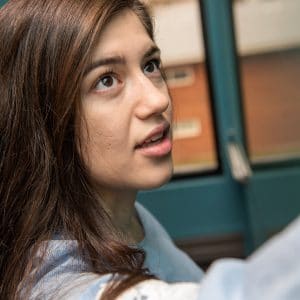Student spotlight
Student finds unexpected depth of learning possible through simulation games
 Giulia Paulet has strong feelings about academic simulation games. Strong negative feelings.
Giulia Paulet has strong feelings about academic simulation games. Strong negative feelings.
“As soon as I find out there’s a simulation, I want to drop the class,” she admitted.
So it was ironic that when Giulia decided she’d like to do research, the management major found herself as part of a research project to assess the effectiveness of a business management simulation.
She is working with Dr. Geoffrey Dick in The W. A. Franke College of Business, as part of the Interns to Scholars program. The research project surveys students when they complete a management simulation to assess what part of the program worked, and what could be improved. Giulia distributes and collects the surveys, and compiles the data for Dr. Dick, who can then refine the simulation based on feedback from the students.
Two years into the project, she’s now also taking the course in which Dr. Dick uses the simulation. For her, it’s been a revelation into the potential power of a simulation.
“It’s amazing,” she said. “I genuinely played it and I was like, ‘Yes! This is what needs to be in the classroom’—now it all has a meaning; it’s not just words on a paper.”
The experience has given her a unique view into how similar simulations can provoke drastically different responses. She credits Dr. Dick’s years of surveying and tweaking his simulation program with its success as a learning tool.
With a well-run simulation, she said, the learning happens at a much deeper level. Dr. Dick’s simulation involves putting students into groups with each group managing a virtual bottled water company.
“One person’s looking at financial statements, one’s looking at marketing, one’s looking at profit loss, one’s changing prices and looking at inventory—all of these things are being done at once. You’re making quick decisions and putting in place everything you’ve learned from previous classes; everything’s moving very fast. It felt awesome. Awesome.”
Based on the decisions of the group, the company either performs well, or it doesn’t. But since it’s all virtual, there’s no downside, just a great opportunity to take risks, fail, learn, and apply knowledge. Thanks to her research and her experience with the course, Giulia believes there’s hope for other simulations.
“I think if everyone who has a simulation in their class would look at this research, and see what they can modify in theirs, we could make it better.”
